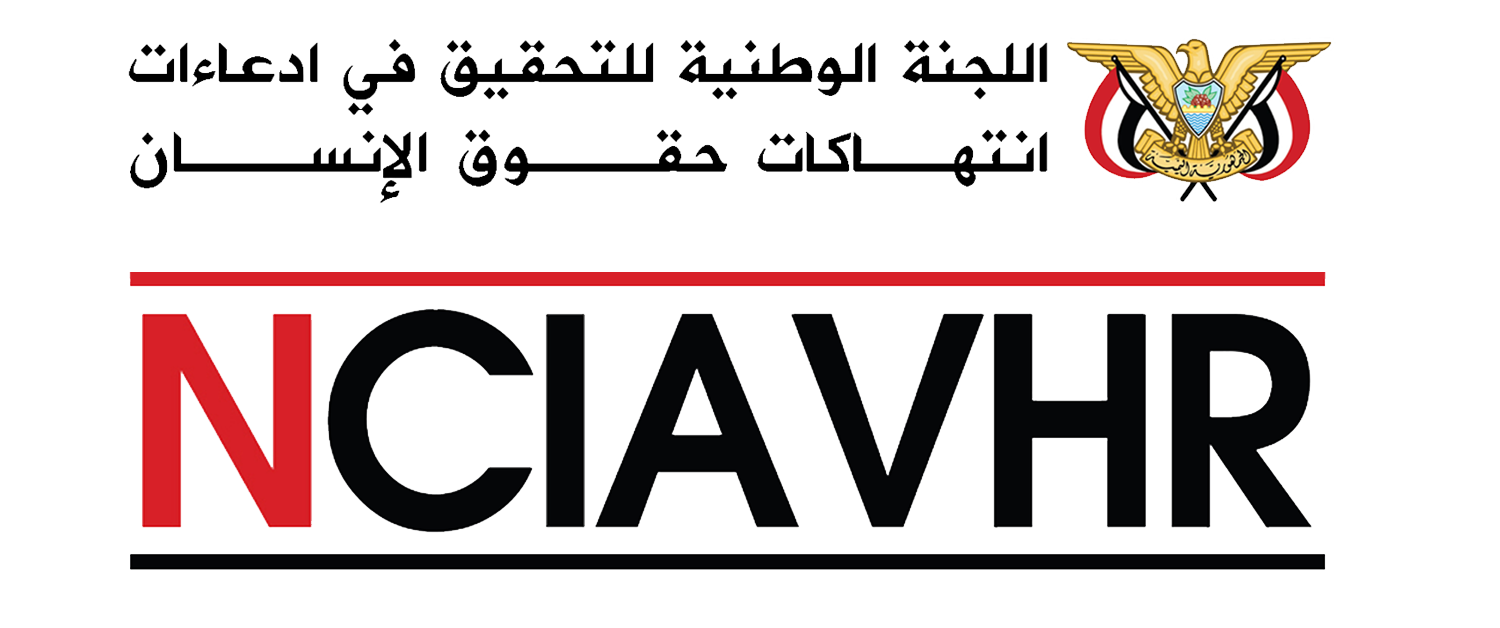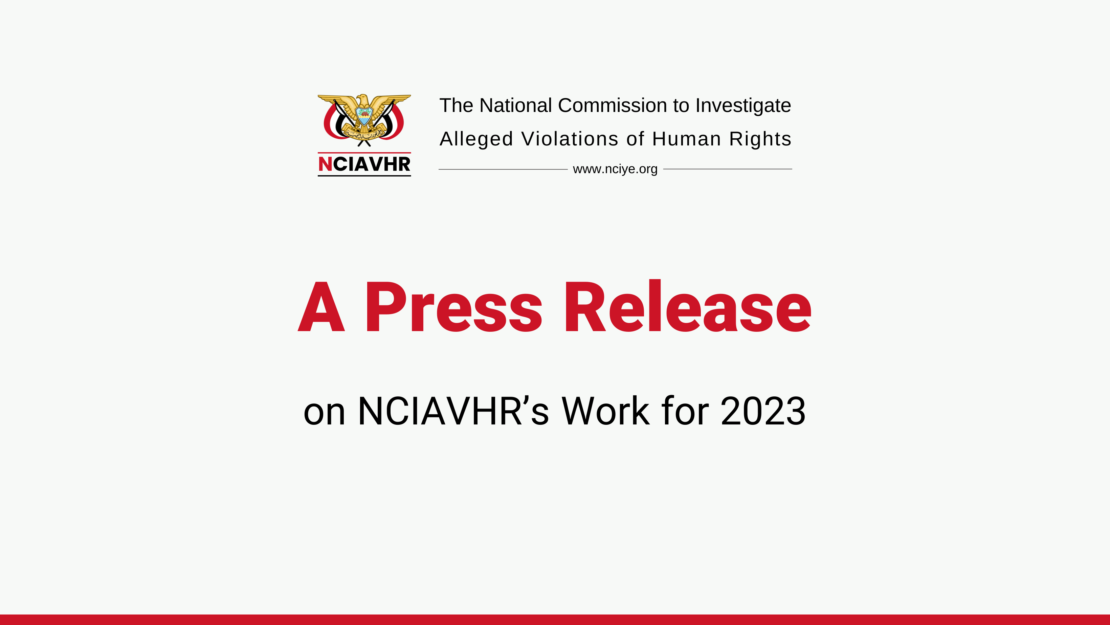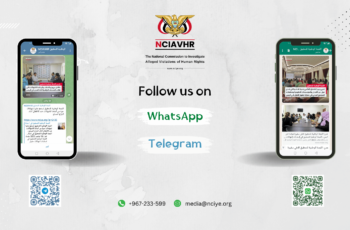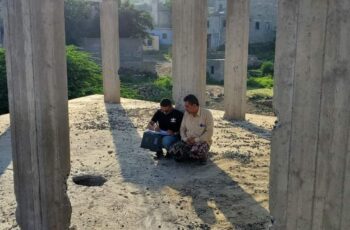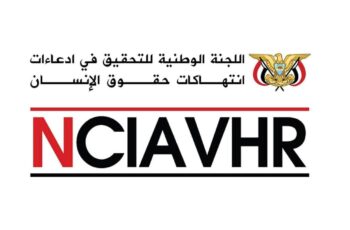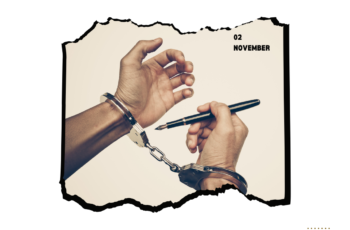A Press Release on NCIAVHR’s Work for 2023
As a commitment to inform the local, regional, and international public opinion and those interested in the developments of human rights situations in Yemen, the National Commission to Investigate Alleged Violations of Human Rights (NCIAVHR) issues its annual statement on the work the Commission has completed in monitoring and investigating human rights violations during the year 2023.
The year 2023 witnessed, through the Commission’s monitoring and field investigations, an ongoing fall of civilian victims due to non-compliance with the undeclared truce, and the commission of patterns of violations that reached a systematic level regarding the planting of anti-personnel mines and their explosion in protected environments, harming children, women, and displaced persons. There were also practices of restricting freedom of opinion and expression arbitrary arrests, and human rights violations against women.
During the year 2023, the Commission succeeded in monitoring and investigating (2,955) violations in many governorates at earlier times, which resulted in harm to (5,152) victims of both genders and all ages. Among them, there were (698) incidents of targeting civilians in which (882) victims fell, including (268) fatalities, including (15) women and (46) children, and (595) injured, including (63) women and (127) children
During that period, the Commission completed its investigations into the deaths of (358) victims of mine and explosive device explosions, including (18) women and (79) children, and the arrest and disappearance of (931) victims, in addition to investigating (9) incidents of targeting historical and religious sites, (3) incidents of attacking medical teams and facilities, as well as investigating (738) incidents of attacks and destruction of private and public property, and (161) incidents of recruiting children under the age of 15.
The Commission also completed investigations into the bombing of (21) houses, the forced displacement of (75) families, and (60) incidents of extrajudicial killings. During the investigation process of all these incidents, the Commission was able to listen to over (8,241) informants and witnesses and examine over (7506) different documents.
In continuation of direct investigation work, the Chairman and members of the Commission conducted (14) field visits to the governorates of Taiz, Hodeidah, Dhalea, Marib, Hadramout, Shabwa, and Abyan to investigate incidents of anti-personnel mine explosions, targeting neighborhoods and residential areas, destroying schools and health facilities, and inspecting contact areas and the humanitarian situation of civilians therein.
During the field visits, the Commission listened to dozens of victims, their families, eyewitnesses, and held meetings with local authority leaders, police directors, intelligence, political security, prisons, brigades, military axes, and evaluated the situation of detainees and their detention centers and prisons in those governorates.
In the same context, the Commission’s monitors carried out dozens of field visits to remote and mountainous districts in the governorates of Al-Jawf, Hajjah, Al-Bayda, Abyan, Saada, Dhamar, Sana’a, Amanat Al-Asemah, Amran, and Al-Mahwit, and conducted direct interviews with victims of torture, property looting, and child recruitment.
During the year 2023, the Commission conducted more than (12) public and closed, individual and collective, hearings to verify the effects of some serious violations on direct and indirect victims due to mine explosions, suppression of freedom of opinion and expression, and forced displacement. These hearings documented the stories of some categories of victims, including journalists, women, victims of mutilation, and gender-based violence.
In the context of its cooperation with local and international civil society organizations and donors, the Commission conducted (10) workshops and discussions with organizations working on documenting violations in the governorates of Aden, Al-Hodeidah, Taiz, Marib, and Shabwa. It also held extensive workshops in Geneva, Switzerland on the sidelines of the 54th session of the Human Rights Council, as well as many virtual workshops.
During the same year, the Commission met in its office in the interim capital Aden with representatives of international organizations including Human Rights Watch, the International Committee of the Red Cross, Save the Children organization, and the Swedish Agency for Development Cooperation. It also met with the International Commission on Missing Persons in The Hague.
As part of its cooperation and coordination with international mechanisms, missions, and embassies concerned with the Yemeni file, the Commission held extensive meetings during the year 2023 with ambassadors, diplomats, and representatives from the embassies of Britain, the Netherlands, Norway, and European Union countries in Yemen. It also met with ambassadors and representatives of the European Union and the Arab Group in Geneva.
These meetings addressed opportunities for accountability and justice for victims, in addition to holding two meetings with the International Sanctions Committee of the Security Council regarding Yemen. The Commission also discussed the role of documenting human rights violations in building a just, effective, and comprehensive peace based on the participation of victims with the senior advisers of the UN envoy during their meeting at the Commission’s office in Aden.
The Commission also made sure to continue its cooperation with the judiciary, as it held a meeting with the Supreme Judicial Council to discuss ways of cooperation in activating the judiciary and reducing violations. The Commission also involved several judicial personnel in its internal and external activities.
To enhance their field and administrative capacities, the Commission implemented several internal and external training workshops related to the updates of the Commission’s investigations, with the support of various donors including the International Center for Transitional Justice, the Office of the High Commissioner for Human Rights, the International Committee of the Red Cross, and the research center affiliated with the Arab League.
To clarify its investigative work, the Commission issued its 11th periodic report covering its investigative results for the period from August 1, 2022, to July 31, 2023. In addition, it issued (7) monthly press releases coinciding with various international events, explaining its working mechanisms and the most significant types of violations in Yemen.
The work of the Commission for 2023 was crowned with the issuance of Presidential Decree No. (16) of 2023, extending the work of the National Commission for two years to enable it to carry out its work professionally and objectively. This was followed by a meeting with the President of the Presidential Council and the delivery of the 11th periodic report, which in turn directed all parties to cooperate with the Committee facilitate its field visits, and respond to its inquiries.
Following this, in October of last year, Human Rights Council Resolution A/HRC/L.28/54 was issued, continuing to support the National Committee for Investigation with support equivalent to that provided to any similar international investigation committee, to carry out its investigation of violations, and urging all parties to facilitate its tasks and access to all areas to fulfill its obligations.
With the start of the new year, and with the media, political, and official human rights circles discussing the possibility of reaching a roadmap for a ceasefire and confidence-building measures that include releasing all detainees, paying salaries, opening main roads, and lifting the siege on Taiz, the Commission calls on all parties to respond to opportunities for peacebuilding in Yemen. It emphasizes that any peace will not succeed, continue, or create a peaceful society free from marginalization if it is not based on justice for victims and revealing the truth by involving everyone early on in all practical peacebuilding measures.
The Commission also calls on all parties to adhere to the principles of international humanitarian law, stop indiscriminate shelling of residential neighborhoods and all forms of harm to victims, as well as practices of discrimination, exclusion, narrowing civic space, and media freedoms.
Published by: The National Commission to Investigate
Alleged Violations of Human Rights (NCIAVHR)
Aden | Monday, January 01, 2024
